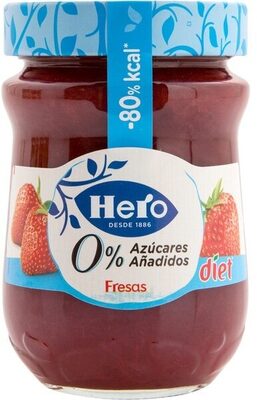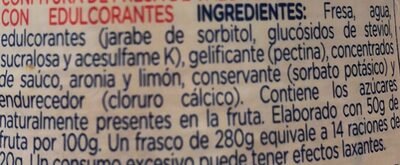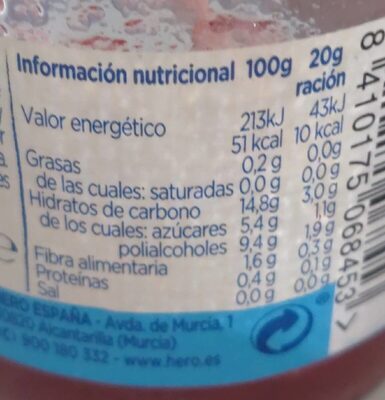Ajuda'ns a fer que la transparència alimentària sigui la norma!
Com a organització sense ànim de lucre, depenem de les vostres donacions per continuar informant els consumidors de tot el món sobre tot allò què mengen.
La revolució alimentària comença amb tu!
Confitura de fresas diet - Hero - 280g
Confitura de fresas diet - Hero - 280g
Aquesta pàgina del producte no està completa. Podeu ajudar a completar-la editant-la i afegint-hi més dades a partir de les fotos ja disponibles, o fent-ne més amb l'aplicació de androide o iPhone / iPad. Gràcies!
×
Codi de barres: 8410175068453 (EAN / EAN-13)
Quantitat: 280g
Marques: Hero
Categories: Aliments i begudes amb base vegetal, Aliments amb base vegetal, Aliments amb base de fruites i verdures, Esmorzars, Productes per untar, Aliments amb base de fruites, Productes amb base vegetal per untar, Productes dolços per untar, Conserves de fruita, Melmelades, Melmelada de baies, Melmelades de maduixa
Etiquetes, certificacions, premis:
Lliure de gluten, Vegetarià, Vegà, Punt verd
Matching with your preferences
Salut
Ingredients
-
16 ingredients
: Fresa, agua, edulcorantes (jarabe de sorbitol, glucósidos de stevio, sucralosa y acesulfame K), gelificante (pectina), concentrados de saúco, aronia y limón, conservante (sorbato potásico) endurecedor (clóruro cálcico).
Processament d'aliments
-
Aliments ultra processats
Elements que indiquen que el producte està al grup 4 - Aliments i begudes ultraprocessats:
- Additiu: E420 - Sorbitol
- Additiu: E440 - Pectina
- Additiu: E950 - Acesulfam K
- Additiu: E955 - Sucralosa
- Ingredient: Enfortidor
- Ingredient: Gelificant
- Ingredient: Edulcorant
Els productes alimentaris es classifiquen en 4 grups segons el seu grau de processament:
- Aliments no processats o mínimament processats
- Ingredients culinaris processats
- Aliments processats
- Aliments ultra processats
La determinació del grup es fa en funció de la categoria del producte i dels ingredients que conté.
Additius
-
E202 - Sorbat de potassi
Potassium sorbate: Potassium sorbate is the potassium salt of sorbic acid, chemical formula CH3CH=CH−CH=CH−CO2K. It is a white salt that is very soluble in water -58.2% at 20 °C-. It is primarily used as a food preservative -E number 202-. Potassium sorbate is effective in a variety of applications including food, wine, and personal-care products. While sorbic acid is naturally occurring in some berries, virtually all of the world's production of sorbic acid, from which potassium sorbate is derived, is manufactured synthetically.Origen: Wikipedia (Anglès)
-
E420 - Sorbitol
Sorbitol: Sorbitol --, less commonly known as glucitol --, is a sugar alcohol with a sweet taste which the human body metabolizes slowly. It can be obtained by reduction of glucose, which changes the aldehyde group to a hydroxyl group. Most sorbitol is made from corn syrup, but it is also found in nature, for example in apples, pears, peaches, and prunes. It is converted to fructose by sorbitol-6-phosphate 2-dehydrogenase. Sorbitol is an isomer of mannitol, another sugar alcohol; the two differ only in the orientation of the hydroxyl group on carbon 2. While similar, the two sugar alcohols have very different sources in nature, melting points, and uses.Origen: Wikipedia (Anglès)
-
E420ii
Sorbitol: Sorbitol --, less commonly known as glucitol --, is a sugar alcohol with a sweet taste which the human body metabolizes slowly. It can be obtained by reduction of glucose, which changes the aldehyde group to a hydroxyl group. Most sorbitol is made from corn syrup, but it is also found in nature, for example in apples, pears, peaches, and prunes. It is converted to fructose by sorbitol-6-phosphate 2-dehydrogenase. Sorbitol is an isomer of mannitol, another sugar alcohol; the two differ only in the orientation of the hydroxyl group on carbon 2. While similar, the two sugar alcohols have very different sources in nature, melting points, and uses.Origen: Wikipedia (Anglès)
-
E440 - Pectina
Pectin: Pectin -from Ancient Greek: πηκτικός pēktikós, "congealed, curdled"- is a structural heteropolysaccharide contained in the primary cell walls of terrestrial plants. It was first isolated and described in 1825 by Henri Braconnot. It is produced commercially as a white to light brown powder, mainly extracted from citrus fruits, and is used in food as a gelling agent, particularly in jams and jellies. It is also used in dessert fillings, medicines, sweets, as a stabilizer in fruit juices and milk drinks, and as a source of dietary fiber.Origen: Wikipedia (Anglès)
-
E950 - Acesulfam K
Acesulfame potassium: Acesulfame potassium - AY-see-SUL-faym-, also known as acesulfame K -K is the symbol for potassium- or Ace K, is a calorie-free sugar substitute -artificial sweetener- often marketed under the trade names Sunett and Sweet One. In the European Union, it is known under the E number -additive code- E950. It was discovered accidentally in 1967 by German chemist Karl Clauss at Hoechst AG -now Nutrinova-. In chemical structure, acesulfame potassium is the potassium salt of 6-methyl-1‚2,3-oxathiazine-4-3H--one 2‚2-dioxide. It is a white crystalline powder with molecular formula C4H4KNO4S and a molecular weight of 201.24 g/mol.Origen: Wikipedia (Anglès)
-
E955 - Sucralosa
Sucralose: Sucralose is an artificial sweetener and sugar substitute. The majority of ingested sucralose is not broken down by the body, so it is noncaloric. In the European Union, it is also known under the E number E955. It is produced by chlorination of sucrose. Sucralose is about 320 to 1‚000 times sweeter than sucrose, three times as sweet as both aspartame and acesulfame potassium, and twice as sweet as sodium saccharin. Evidence of benefit is lacking for long-term weight loss with some data supporting weight gain and heart disease risks.It is stable under heat and over a broad range of pH conditions. Therefore, it can be used in baking or in products that require a long shelf life. The commercial success of sucralose-based products stems from its favorable comparison to other low-calorie sweeteners in terms of taste, stability, and safety. Common brand names of sucralose-based sweeteners are Splenda, Zerocal, Sukrana, SucraPlus, Candys, Cukren, and Nevella. Canderel Yellow also contains sucralose, but the original Canderel and Green Canderel do not.Origen: Wikipedia (Anglès)
Anàlisi dels ingredients
-
No conté oli de palma
No s'han detectat ingredients que continguin oli de palma
Ingredients no reconeguts: es:glucosidos-de-stevioAlguns ingredients no s'han pogut reconèixer.
Necessitem la teva ajuda!
Podeu ajudar-nos a reconèixer més ingredients i analitzar millor la llista d'ingredients d'aquest producte i d'altres mitjançant:
- Editeu aquesta pàgina de producte per corregir les faltes d’ortografia de la llista d’ingredients i/o per eliminar els ingredients d’altres idiomes i frases que no estiguin relacionades amb els ingredients.
- Afegiu entrades, sinònims o traduccions noves a les nostres llistes multilingües d’ingredients, mètodes de processament d’ingredients i etiquetes.
Uniu-vos al canal #ingredients del nostre espai de discussió a Slack i/o apreneu sobre l'anàlisi dels ingredients en la nostra wiki, si voleu ajudar. Gràcies!
-
Vegà
No s'han detectat ingredients no vegans
Ingredients no reconeguts: es:glucosidos-de-stevio, en:ElderAlguns ingredients no s'han pogut reconèixer.
Necessitem la teva ajuda!
Podeu ajudar-nos a reconèixer més ingredients i analitzar millor la llista d'ingredients d'aquest producte i d'altres mitjançant:
- Editeu aquesta pàgina de producte per corregir les faltes d’ortografia de la llista d’ingredients i/o per eliminar els ingredients d’altres idiomes i frases que no estiguin relacionades amb els ingredients.
- Afegiu entrades, sinònims o traduccions noves a les nostres llistes multilingües d’ingredients, mètodes de processament d’ingredients i etiquetes.
Uniu-vos al canal #ingredients del nostre espai de discussió a Slack i/o apreneu sobre l'anàlisi dels ingredients en la nostra wiki, si voleu ajudar. Gràcies!
-
Vegetarià
No s'han detectat ingredients no vegetarians
Ingredients no reconeguts: es:glucosidos-de-stevio, en:ElderAlguns ingredients no s'han pogut reconèixer.
Necessitem la teva ajuda!
Podeu ajudar-nos a reconèixer més ingredients i analitzar millor la llista d'ingredients d'aquest producte i d'altres mitjançant:
- Editeu aquesta pàgina de producte per corregir les faltes d’ortografia de la llista d’ingredients i/o per eliminar els ingredients d’altres idiomes i frases que no estiguin relacionades amb els ingredients.
- Afegiu entrades, sinònims o traduccions noves a les nostres llistes multilingües d’ingredients, mètodes de processament d’ingredients i etiquetes.
Uniu-vos al canal #ingredients del nostre espai de discussió a Slack i/o apreneu sobre l'anàlisi dels ingredients en la nostra wiki, si voleu ajudar. Gràcies!
-
Detalls de l'anàlisi dels ingredients
Necessitem la teva ajuda!
Alguns ingredients no s'han pogut reconèixer.
Necessitem la teva ajuda!
Podeu ajudar-nos a reconèixer més ingredients i analitzar millor la llista d'ingredients d'aquest producte i d'altres mitjançant:
- Editeu aquesta pàgina de producte per corregir les faltes d’ortografia de la llista d’ingredients i/o per eliminar els ingredients d’altres idiomes i frases que no estiguin relacionades amb els ingredients.
- Afegiu entrades, sinònims o traduccions noves a les nostres llistes multilingües d’ingredients, mètodes de processament d’ingredients i etiquetes.
Uniu-vos al canal #ingredients del nostre espai de discussió a Slack i/o apreneu sobre l'anàlisi dels ingredients en la nostra wiki, si voleu ajudar. Gràcies!
: Fresa, agua, edulcorantes (jarabe de sorbitol, glucósidos de stevio, sucralosa, acesulfame K), gelificante (pectina), de saúco, aronia, limón, conservante (sorbato potásico), endurecedor (clóruro cálcico)- Fresa -> en:strawberry - vegan: yes - vegetarian: yes - ciqual_food_code: 13014 - percent_min: 11.1111111111111 - percent_max: 100
- agua -> en:water - vegan: yes - vegetarian: yes - ciqual_food_code: 18066 - percent_min: 0 - percent_max: 50
- edulcorantes -> en:sweetener - percent_min: 0 - percent_max: 33.3333333333333
- jarabe de sorbitol -> en:e420ii - vegan: yes - vegetarian: yes - percent_min: 0 - percent_max: 33.3333333333333
- glucósidos de stevio -> es:glucosidos-de-stevio - percent_min: 0 - percent_max: 16.6666666666667
- sucralosa -> en:e955 - vegan: yes - vegetarian: yes - percent_min: 0 - percent_max: 11.1111111111111
- acesulfame K -> en:e950 - vegan: yes - vegetarian: yes - percent_min: 0 - percent_max: 8.33333333333333
- gelificante -> en:gelling-agent - percent_min: 0 - percent_max: 25
- pectina -> en:e440a - vegan: yes - vegetarian: yes - percent_min: 0 - percent_max: 25
- de saúco -> en:elder - percent_min: 0 - percent_max: 20
- aronia -> en:chokeberry - vegan: yes - vegetarian: yes - percent_min: 0 - percent_max: 16.6666666666667
- limón -> en:lemon - vegan: yes - vegetarian: yes - ciqual_proxy_food_code: 13009 - percent_min: 0 - percent_max: 14.2857142857143
- conservante -> en:preservative - percent_min: 0 - percent_max: 12.5
- sorbato potásico -> en:e202 - vegan: yes - vegetarian: yes - percent_min: 0 - percent_max: 12.5
- endurecedor -> en:firming-agent - percent_min: 0 - percent_max: 11.1111111111111
- clóruro cálcico -> en:e509 - vegan: yes - vegetarian: yes - percent_min: 0 - percent_max: 11.1111111111111
Nutrició
-
Molt bona qualitat nutricional
⚠ ️Atenció: la quantitat de fruita, verdura i fruits secs no s'especifica a l'etiqueta, s'ha fet una estimació a partir de la llista d'ingredients: 57Aquest producte no es considera una beguda per al càlcul de la Nutri-Score.
Punts positius: 2
- Proteïnes: 0 / 5 (valor: 0.4, valor arrodonit: 0.4)
- Fibra: 1 / 5 (valor: 1.6, valor arrodonit: 1.6)
- Fruites, verdures, fruits secs i olis de colza/nou/oliva: 1 / 5 (valor: 57.6388888888889, valor arrodonit: 57.6)
Punts negatius: 1
- Energia: 0 / 10 (valor: 213, valor arrodonit: 213)
- Sucres: 1 / 10 (valor: 5.4, valor arrodonit: 5.4)
- Greixos saturats: 0 / 10 (valor: 0, valor arrodonit: 0)
- Sodi: 0 / 10 (valor: 0, valor arrodonit: 0)
Els punts per proteïnes es compten perquè els punts negatius són inferiors a 11.
Puntuació nutricional: (1 - 2)
Nutri-Score:
-
Nivells de nutrients
-
Greix en baixa quantitat (0.2%)
Què us cal saber- Un alt consum de greixos, especialment de greixos saturats, pot augmentar el colesterol, que augmenta el risc de patir malalties del cor.
Recomanació: Reduïu el consum de greixos i greixos saturats- Trieu productes amb menys greixos i greixos saturats.
-
Àcid gras saturat en baixa quantitat (0%)
Què us cal saber- Un alt consum de greixos, especialment de greixos saturats, pot augmentar el colesterol, que augmenta el risc de patir malalties del cor.
Recomanació: Reduïu el consum de greixos i greixos saturats- Trieu productes amb menys greixos i greixos saturats.
-
Sucre en Quantitat moderada (5.4%)
Què us cal saber- Un alt consum de sucre pot provocar augment de pes i càries dental. També augmenta el risc de patir diabetis tipus 2 i malalties cardiovasculars.
Recomanació: Limitau el consum de sucre i de begudes ensucrades- Les begudes ensucrades (com ara refrescos, begudes de fruites i sucs i nèctars de fruites) s'han de limitar tant com sigui possible (no més d'1 got al dia).
- Triau productes amb menor contingut de sucre i reduïu el consum de productes amb sucres afegits.
-
Sal comuna en baixa quantitat (0%)
Què us cal saber- Un alt consum de sal (o sodi) pot provocar un augment de la pressió arterial, que pot augmentar el risc de patir malalties del cor i ictus.
- Moltes persones que tenen hipertensió no ho saben, ja que sovint no en tenen símptomes.
- La majoria de la gent consumeix massa sal (de 9 a 12 grams de mitjana al dia), al voltant del doble del nivell màxim d'ingesta recomanat.
Recomanació: Limitau la ingesta de sal i d'aliments rics en sal- Reduïu la sal que emprau quan cuinau, i no afegiu sal a taula.
- Limiteu el consum d'aperitius salats i trieu productes amb menor contingut de sal.
-
-
Informació nutricional
Informació nutricional Com es ven
per 100 g/100 mlCom es ven
per porció (100g)Comparat amb: Melmelades de maduixa Energia 213 kj
(51 kcal)213 kj
(51 kcal)-70% Greix 0,2 g 0,2 g +68% Àcid gras saturat 0 g 0 g -100% Hidrats de carboni 14,8 g 14,8 g -63% Sucre 5,4 g 5,4 g -85% Fiber 1,6 g 1,6 g +29% Proteïna 0,4 g 0,4 g -11% Sal comuna 0 g 0 g -100% Fruits‚ vegetables‚ nuts and rapeseed‚ walnut and olive oils (estimate from ingredients list analysis) 57,639 % 57,639 %
Entorn
-
Eco-puntuació B - Impacte ambiental baix
El Eco-Score és una puntuació experimental que resumeix els impactes ambientals dels productes alimentaris.→ L'Eco-Score es va desenvolupar inicialment a França i s'està ampliant per a altres països europeus. La fórmula Eco-Score està subjecta a canvis, ja que es millora periòdicament per fer-la més precisa i més adequada per a cada país.Anàlisi del cicle de vida
-
Impacte mitjà dels productes de la mateixa categoria: A (Score: 80/100)
Categoria: Jam, strawberry
Categoria: Jam, strawberry
- Puntuació ambiental PEF ( petjada ambiental de l'aliment ): 0.27 (com més baixa sigui la puntuació, menor serà l'impacte)
- incloent l'impacte sobre el canvi climàtic: 1.42 kg CO₂ eq/kg del producte
Etapa Impacte Agricultura
53.9 %Processament
14.3 %Empaquetament
20.4 %Transport
8.7 %Distribució
1.8 %Consum
0.9 %
Bonificacions i punts negatius
-
Falta informació sobre l'origen dels ingredients
Punts negatius: -5
⚠ ️ L'origen dels ingredients d'aquest producte no està indicat.
Si estan indicats a l'embalatge, podeu modificar la fitxa del producte i afegir-los.
Si sou el fabricant d'aquest producte, podeu enviar-nos la informació amb la nostra plataforma gratuïta per a productors.
-
Falta informació sobre l'embalatge d'aquest producte
Punts negatius: -15
⚠ ️ La informació sobre l'embalatge d'aquest producte no està completada.⚠ ️ Per a un càlcul més precís de l'Eco-Score, podeu modificar la pàgina del producte i afegir-los.
Si sou el fabricant d'aquest producte, podeu enviar-nos la informació amb la nostra plataforma gratuïta per a productors.
Eco-Score per a aquest producte
-
Impacte per a aquest producte: B (Score: 60/100)
Producte: Confitura de fresas diet - Hero - 280g
Puntuació de l'anàlisi del cicle de vida: 80
Suma de bonificacions i punts negatius: -20
Puntuació final: 60/100
-
Petjada de carboni
-
Equivalent a conduir 0.7 km en un cotxe de gasolina
142 g de CO² per cada 100 g de producte
La xifra d'emissions de carboni prové de la base de dades Agribalyse d'ADEME, per a la categoria: Jam, strawberry (Font: Base de dades ADEME Agribalyse)
Etapa Impacte Agricultura
23.1 %Processament
17.7 %Empaquetament
37.0 %Transport
20.2 %Distribució
1.4 %Consum
0.5 %
Empaquetament
-
Falta informació sobre l'embalatge d'aquest producte
⚠ ️ La informació sobre l'embalatge d'aquest producte no està completada.Take a photo of the recycling information Take a photo of the recycling information
Transport
-
Orígens dels ingredients
Falta informació sobre l'origen dels ingredients
⚠ ️ L'origen dels ingredients d'aquest producte no està indicat.
Si estan indicats a l'embalatge, podeu modificar la fitxa del producte i afegir-los.
Si sou el fabricant d'aquest producte, podeu enviar-nos la informació amb la nostra plataforma gratuïta per a productors.Add the origins of ingredients for this product Add the origins of ingredients for this product
Report a problem
-
Incomplete or incorrect information?
Category, labels, ingredients, allergens, nutritional information, photos etc.
If the information does not match the information on the packaging, please complete or correct it. Open Food Facts is a collaborative database, and every contribution is useful for all.
Fonts de dades
Producte afegit per kiliweb
Última modificació de la pàgina del producte per lorsitog.
La pàgina del producte, també editada per acuario, davidepio, ecoscore-impact-estimator, musarana, openfoodfacts-contributors, roboto-app, scanbot, thaialagata, yuka.AOhCMYSvAcAsGMrRyoIazGe4GcH8DtpnCmxRow, yuka.UTZFTk1vTUZsdjhnaWR0anBUYjYvb3BFOTc2cVRHem1PZTRqSVE9PQ, yuka.WEpGZkNac3doNklIZ3MwZjFDbU0wSTVLNXBXVFd6S3NKdElTSWc9PQ, yuka.XIBSHvWHHMkmEvDu14Uw-RK3Ou3JAqRwRnJUog, yuka.YUk4NEdyb0NpL29tdU1ZYm9UL01wUFZaeXFLU1RYNmVFN1ZCSUE9PQ, yuka.ZTQwRk9iNGEvZDBTaWZjNHBDN0YzdkI4MThldERYeXdGTElKSWc9PQ, yuka.sY2b0xO6T85zoF3NwEKvlk5IA4TC-CrnCwXSnW-6xP6jFcLsW9Yu_tLoIqs, yuka.sY2b0xO6T85zoF3NwEKvll5YY_CBvh3JBT_ggkGN-9zXM4zvft9-47bmH6s, yuka.sY2b0xO6T85zoF3NwEKvlmtFfYH-nRSbZyTfmXWxzf2eFL3Zethp763BNag.










